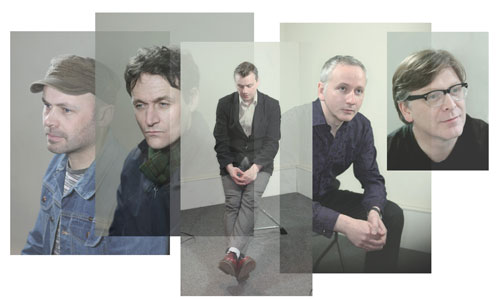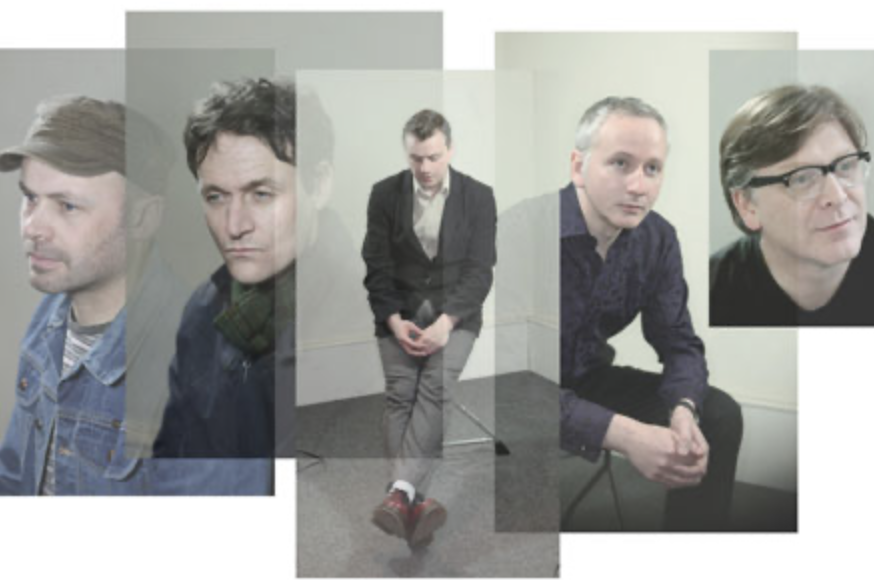
It’s dead easy to list the most obvious influences of Scotland’s Teenage Fanclub. He’s read them so often, founding band member Norman Blake can rattle them off at the drop of a tam: Big Star, Byrds, Beach Boys. Pigeonholing the Fanclub’s melodic-yet-rocking sound becomes a little more dicey. Though most of the cornerstones of power pop—Posies, Flamin’ Groovies, Matthew Sweet, Velvet Crush, Tommy Keene, Alex Chilton—don’t think much of the label, it seems to be the only one that’s stuck. If they keep this up for another five years or so, Teenage Fanclub, which opened for business in the mid-’80s when Blake met fellow Scots Raymond McGinley and Gerard Love, might surpass the Groovies for career longevity, a career award that usually precedes only the obit in a band’s publicity dossier. And yet, the group’s new album, Shadows (Merge), is as vital as anything TFC has ever cut, adding fuel to the proposition that some artists come up with their best work after turning 40. Blake and Love will be guest editing magnetmagazine.com all week.
MAGNET: Where are you living these days, Norman?
Blake: I’m in Edinburgh today. We played Glasgow last night. I’m looking forward to the upcoming tour (of North America). It will be like a home date for me, because I’ve actually moved to Canada about six months ago. My wife’s Canadian. It’s gonna be great not having jetlag when you start the tour. I’ve been enjoying it, apart from the snow. The snow’s been a shock to the system, but I’m getting used to it.
Have they turned you into a hockey fan yet?
I’m not a big fan, but I suppose I’ll have to learn, because, of course, you have to have a sports conversation with the public. I’m gonna have to start reading the back pages (sports section).
Well, I can give you the simplest possible explanation of hockey. It’s very much like your football, only it’s on ice and they use sticks.
Yeah, it really is, and you get the odd fight thrown in there, too.
Are you excited about the World Cup in South Africa?
Yeah, I’m looking forward to that, actually. Something I always enjoy. I haven’t really picked my club. We didn’t make it. It’s a shame. Scotland don’t get in there very often. I haven’t picked who I’m going to support yet. I think I’ll go for someone like Brazil.
Well, you can’t go wrong there, since they seem to win it about every other time.
I like Spain, too. Spain’s a country that’s been very good to me over the years. Yeah, it’s definitely Spain this year for me. I like the culture there. I like the way they have dinner at eight o’clock in the evening. The band has had some fabulous nights there. I really do love the Spanish way of life. You’re never onstage before midnight. And festivals are always good. The lineups are always great.
I’ve read articles about Teenage Fanclub where they try to describe your music and usually get it all wrong. Somebody called it grunge. Another one referred to it as shoegaze. [Laughs]
We always get the same influences listed, what we’re about: Big Star, the Byrds, the Beach Boys. And, of course, these are things we like. But those ones always crop up, like you don’t listen to anyone else. You get to see a pattern develop. But we’re influenced by many, many other things. For (1991’s) Bandwagonesque album, we were listening to Exile On Main St. And, of course, we got to meet and work with Alex Chilton. We had a good relationship with him. I don’t know if he saw something of the young Alex in us, but we certainly got on well with him. Alex’s widow, Laura, is spending a couple of weeks in Scotland, and she was at the show last night in Glasgow. It was great to have her there.
Have you ever wondered if old geezers might buy your new album, Shadows, thinking it’s something new from the Shadows and Hank B. Marvin?
Well, there’s not much wrong with the Shadows. [Laughs] I’m a big fan of the Shadows. I’ve heard the young Neil Young really liked the Shadows.
You’ve recorded the new album with backing vocals by Euros Childs from Gorky’s Zygotic Mynci?
Yeah, he’s a good friend of mine. We toured with them years ago. Me and Euros just struck up a friendship. He was up staying with me a year and a half ago. We ended up writing little songs together, recorded 10 of them about six months ago and made an album. We go by the name of Jonny. From something that was just a bit of fun, really, it’s great that we’ve put out a record.
Did you ever see the Skids, a great late-’70s punk band from Dunfermline?
I never saw ’em, but we met Stuart Adamson through a few charity events that happened in Glasgow. Also, we were recording in a studio in Scotland that he happened to be working in, too. And we had a couple of games of soccer with him, as you do in summer. We played against a wall, you know. You can imagine it like kids playing basketball in the U.S.
How did you first meet Raymond and Gerry?
Well, myself and Raymond used to go to a club in Glasgow called Splash I, named after the 13th Floor Elevators song. We were playing them on the bus today on the way to the show. It was probably around ’85 when we met. The club was run by Bobby Gillespie from Primal Scream. They played great music there, and they put on great bands: Wire, Felt, the Jesus And Mary Chain, all the early shows were there. So, we met there, and I’d met Gerry also, and that was the nucleus of the band.
Why did you call your band Teenage Fanclub?
We thought there were a lot of pretentious band names around at that time, so we liked the idea of having something that was the antithesis of that. Something that was completely dumb and meaningless. We liked the ridiculous idea of that.
Have you ever had second thoughts about using the name?
Not at all. I’ll tell you why. It’s always been an ironic name, because none of us were teenagers when we started the band. Actually, I tell a lie: Brendan, our drummer, was 17. But I was 21, Raymond was 22 and Gerry was 20. So it was even ironic then. We got stopped at a border crossing a while ago and they asked who was in the van. And the guy driving said, “A band called Teenage Fanclub.” So the guy opened the door and he was nonplussed: “Teenage Fanclub? These guys are all pensioners.”
Well, there are precedents to taking a name like that. There was a famous vocal group from the ’50s called the Four Freshmen, who are not only no longer freshmen, but most of them are no longer with us. With an arbitrary name like yours you can follow in the grand tradition of the Bay City Rollers, who I happen to like a lot, actually.
Well, there you go, yeah. I don’t know if you’ve seen the clip of them that’s going around at the moment. It’s a clip of the Bay City Rollers with Ann-Margret singing “Saturday Night” on Irish TV to a roomful of geriatrics. It’s really fantastic.
How was it working for Alan McGee and Creation Records, one of my favorite labels?
We’d known Alan, again, since the days of Splash I. And he’d liked what Raymond and I did in one of our previous bands. After we made our first Teenage Fanclub record [1990’s A Catholic Education], he came along and said he’d love us to sign to Creation. We kinda felt it would be a good place to go, and we liked a lot of the music that was done there: My Bloody Valentine and Felt. So we started making an album. We didn’t have a contract. Alan just started paying for us to go in the studio. Before you knew it, we had finished the Bandwagonesque record. It was a really great label for us because they allowed us to do what we wanted to do, total artistic control. He would always say, “You know what? It’s your record.” We always thought that was pretty great.
I like to get tips on films I may not have seen. I’ve always been a fan of Scottish Cinema: Ratcatcher, Morvern Callar, Hallam Foe, Trainspotting, Gregory’s Girl, Red Road, Shallow Grave, Restless Natives. Anything I might have missed?
There’s a really good one by Bill Forsyth called Local Hero. It’s about an American guy sent here by a big oil firm to buy a beach because they’ve discovered oil just off shore. It’s kinda like a modern Brigadoon in a way. He kinda falls in love with the area and reacts against his own company. And he becomes a local hero. The head of the company is Burt Lancaster, who comes over here to find what his young guy is doing. And then he falls in love with place, too. It’s a nice gentle sort of movie, a lot of fun.
I’ve interviewed most of the people labeled, for better or worse, as power pop: the Flamin’ Groovies, Velvet Crush, the Posies, Matthew Sweet. And most of ’em don’t like the term. Tommy Keene told me it was like having a bullseye painted on the back of his shirt. How do you feel about it?
That’s the perfect answer, actually. It’s difficult to define what it is. It’s kind of like that song “Hanging On The Telephone” by the Nerves. I suppose that would be the perfect power-pop song. That’s a really great song. But there are a lot of people out there trying to write melodic songs with fuzzed-up guitar, and they don’t have very good songs. That’s why power pop isn’t a great term, because it sorta lumps everyone in together, all the bad writers with the good ones. It’s a term I don’t really recognize and fancy in our music. So, it’s a funny thing, that, isn’t it?
It is a funny thing, something that’s stuck around for a long time for lack of a better name.
I think that’s what it is. Melodic pop music with an edge has to be redefined in some way.
—Jud Cost
“Baby Lee” (download):








3 replies on “A Conversation With Norman Blake (Teenage Fanclub)”
[…] Issue 29 of Modern Acoustic is up for downloading hereQ & A with The Fannies at Magnet […]
[…] Issue 29 of Modern Acoustic is up for downloading here Q & A with The Fannies at Magnet […]
[…] : “Growing Old peacefully” Magnet Magazine : “Q&A With Teenage Fanclub’s Norman Blake” Paste Magazine (RIP) : “Catching Up With … Teenage Fanclub” Pop Matters : […]